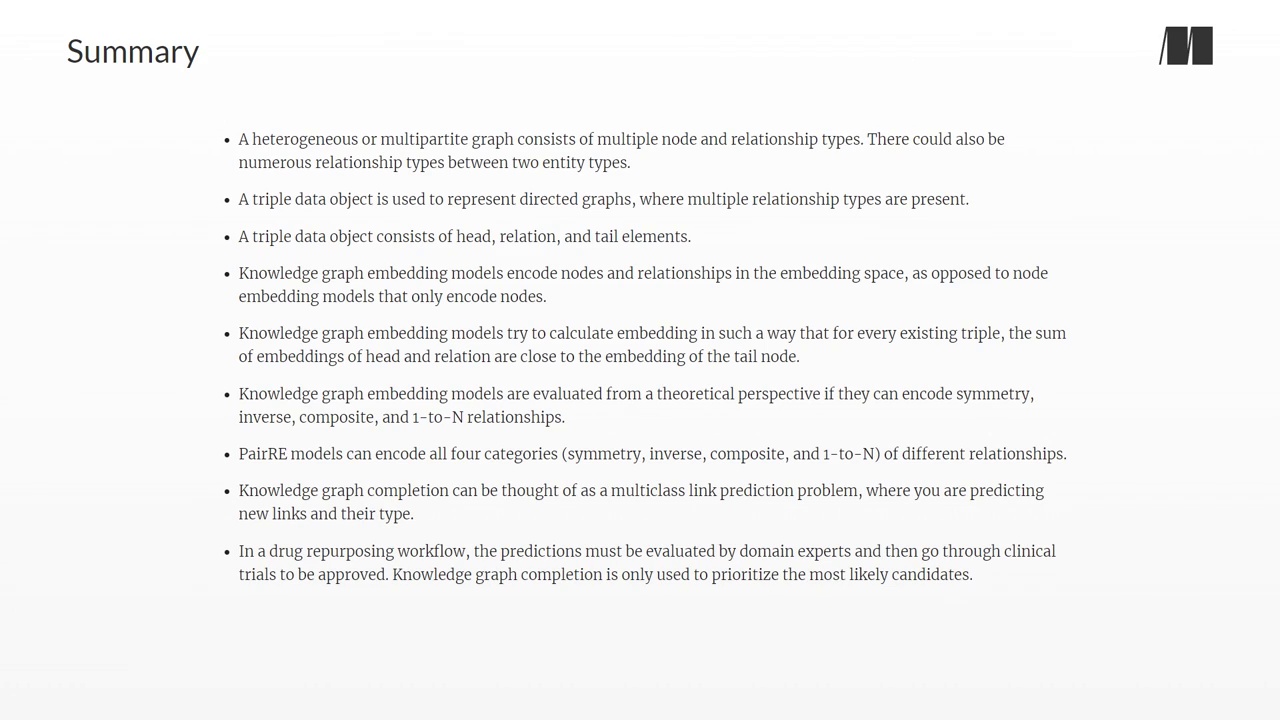001. Part 1. Introduction to graphs
002. Chapter 1. Graphs and network science An introduction
003. Chapter 1. How to spot a graph-shaped problem
004. Chapter 1. Summary
005. Chapter 2. Representing network structure Designing your first graph model
006. Chapter 2. Network representations
007. Chapter 2. Designing your first labeled-property graph model
008. Chapter 2. Extracting knowledge from text
009. Chapter 2. Summary
010. Part 2. Network analysis
011. Chapter 3. Your first steps with Cypher query language
012. Chapter 3. Importing CSV files with Cypher
013. Chapter 3. Solutions to exercises
014. Chapter 3. Summary
015. Chapter 4. Exploratory graph analysis
016. Chapter 4. Aggregating data with Cypher query language
017. Chapter 4. Filtering graph patterns
018. Chapter 4. Counting subqueries
019. Chapter 4. Multiple aggregations in sequence
020. Chapter 4. Solutions to exercises
021. Chapter 4. Summary
022. Chapter 5. Introduction to social network analysis
023. Chapter 5. Introduction to the Neo4j Graph Data Science library
024. Chapter 5. Network characterization
025. Chapter 5. Identifying central nodes
026. Chapter 5. Solutions to exercises
027. Chapter 5. Summary
028. Chapter 6. Projecting monopartite networks
029. Chapter 6. Retweet network characterization
030. Chapter 6. Identifying the most influential content creators
031. Chapter 6. Solutions to exercises
032. Chapter 6. Summary
033. Chapter 7. Inferring co-occurrence networks based on bipartite networks
034. Chapter 7. Constructing the co-occurrence network
035. Chapter 7. Characterization of the co-occurrence network
036. Chapter 7. Community detection with the label propagation algorithm
037. Chapter 7. Identifying community representaties with PageRank
038. Chapter 7. Solutions to exercises
039. Chapter 7. Summary
040. Chapter 8. Constructing a nearest neighbor similarity network
041. Chapter 8. Constructing the nearest neighbor graph
042. Chapter 8. User segmentation with the community detection algorithm
043. Chapter 8. Solutions to exercises
044. Chapter 8. Summary
045. Part 3. Graph machine learning
046. Chapter 9. Node embeddings and classification
047. Chapter 9. Node classification task
048. Chapter 9. The node2ec algorithm
049. Chapter 9. Solutions to exercises
050. Chapter 9. Summary
051. Chapter 10. Link prediction
052. Chapter 10. Dataset split
053. Chapter 10. Network feature engineering
054. Chapter 10. Link prediction classification model
055. Chapter 10. Solutions to exercises
056. Chapter 10. Summary
057. Chapter 11. Knowledge graph completion
058. Chapter 11. Knowledge graph completion
059. Chapter 11. Solutions to exercises
060. Chapter 11. Summary
061. Chapter 12. Constructing a graph using natural language processing techniques
062. Chapter 12. Named entity recognition
063. Chapter 12. Relation extraction
064. Chapter 12. Implementation of information extraction pipeline
065. Chapter 12. Solutions to exercises
066. Chapter 12. Summary
067. Appendix. The Neo4j enironment
068. Appendix. Neo4j installation
069. Appendix. Neo4j Browser configuration

